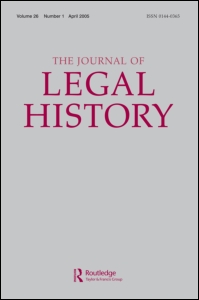(image source: University of Glasgow)
The Evolution of Manor Courts in Medieval England, c.1250–1350: The Evidence of the Personal Actions (Chris Briggs & Philipp R. Schofield)
Abstract:
Manor courts held by landlords for their tenants and other local people existed in their thousands across medieval England. Debate persists concerning the character of these institutions during their heyday in the decades before 1350. This article uses a new database containing hundreds of manorial personal actions – lawsuits which treated areas roughly equivalent to modern tort and contract law – to explore the work of the manor courts, and to reconstruct their development over the first century for which records of their proceedings survive. It is argued that although local variation among manor courts persisted, overall there was a broad process of ‘convergence’. Yet this was not simply a top-down development involving the transmission of practices from the courts of common law, or the communication of external rules by lawyers or landlords. Instead, the suitors, litigants and jurors of the manor courts played a decisive role in this process.Charitable Endowment and Social Change: Cy-Près Orders and Schemes, 1837–1901 (Charles Mitchell)
Abstract:
The article discusses the law governing cy-près applications of charitable endowment during the Victorian period and the institutional framework within which cy-près orders and schemes were made. Powers to make such orders and schemes were vested in the court of chancery and the charity commissioners, a body of administrative officials created in 1853. Some case-studies are undertaken, to gain a better understanding of the approaches taken by the court and the commissioners towards the making of orders and schemes and of their opinions regarding certain social, religious and political issues.Professional Liability and Forensic Science in the Context of the Lex Aquilia (Ido Israelowich)
Abstract:
This article examines the emergence of professional liability and forensic science in the context of the Lex Aquilia. The interpretations of jurists, found in the sections of the Digest discussing the Lex Aquilia, subjected professionals to a higher standard of responsibility and liability, both in the context of locatio-conductio contracts and outside of it. At the same time, the Roman legal system increased its reliance on professionals for determining factual issues in legal disputes. The examples of public physicians, who were dispatched to examine suspicious acts of violence; midwives, who were appointed by the court to determine contested paternity or maternity; and land-surveyors, who presided over boundary disputes, are amongst the most common. This article examines the inter-relation between legislation originating in the Lex Aquilia and the emergence of professional liability on the one hand, and the evolution of forensic science on the other hand.Scottish Legal History Group Report 2019
Migrations of Manuscripts 2019 (Sir John Baker)
Book reviews:
- Surviving Slavery in the British Caribbean (Justine Collins)
- Evaluation of Evidence: Pre-Modern and Modern Approaches (Andrew L-T Choo)
(read more with Taylor&Francis)


No comments:
Post a Comment